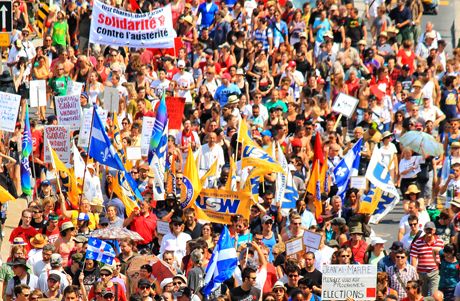News
You are here
New chapter in the Quebec struggle

August 23, 2012
On August 1, two new chapters began in the incredible saga of Quebec’s Red Square movement: an historic election campaign, fought in the midst of the greatest social unrest Quebec has seen in decades, and a new round of student strike votes, this time explicitly for a mandate to defy the Special Law that bans picketing of classes and the right of students to strike.
What underlies both is a social movement whose boundaries exceed that of either the election or the student strike alone. The question this August will be: how can the outcome of the student strike and the elections serve to push those boundaries even farther from where they are now?
Quebec Premier Jean Charest declared the election on August 1st, but that night 15,000 marched, pre-planned, to mark the occasion of the 100th “nocturnal march,” which students and supporters of the Red Square movement have carried out every night since the beginning of the student uprising.
The beginning of August has also seen the relaunch of the “casseroles” in many neighbourhoods, after a brief summer hiatus or slow-down, with neighbours once again bringing their pots and wooden spoons into the streets.
And on Monday August 6, Profs Contre La Hausse (Faculty Against the Hike) held a news conference to unveil their petition-manifesto against the Special Law (Law 12, or Bill 78), signed by 2,000 academics worldwide, including several big names like Judith Butler and Noam Chomsky, and which is gaining an average of 50 signatures by the day. The faculty media conference featured a panel from some of the most important universities in Quebec who pledged with a unified voice to respect student strike votes at the attempted “return” to class. As one of them stated, “the only thing worse than a draconian law is obeying one.”
And that very night, the first new student strike vote result came in, from the Social Work department at a major research university, the Universite de Montreal.
But the election is also a crucial opportunity to translate the importance of the movement to an even wider public in ways that are not about political opportunism as most elections are. The challenge will be to tap the radical potential of the election to reach even deeper into the lives of ordinary people who are not as connected to the movement on the streets as they could be.
QS: a party of the ballot box and the streets
There is no doubt that for Jean Charest and the Quebec Liberals, the election is about distraction: to distract from the student conflict and also from the enquiry into the Liberal party’s far-reaching involvement in corruption and kickbacks.
There is no doubt that for Pauline Marois and the Parti Quebecois, the election is about opportunism: to pretend to run to the front of the student struggle, while being one of the supporters of the lifting of the freeze on tuition since the 90s.
And there is no doubt that the formation of the Coalition de l’Avenir du Quebec has nothing to do with the social struggle and dissatisfaction with corruption that is actually sweeping Quebec, and more about sweeping up the remaining unparked and dissatisfied votes in a rightward direction.
In fact, the only reason why this election is not merely a deliberate distraction from the popular voice of the social movement is that there is a party on the Quebec political scene that originates from previous social movements: Québec solidaire (QS).
Québec solidaire comes directly out of the experience of the anti-globalization movement of the early 2000s and the World March of Women. It then proved itself in the movement against the war in Iraq and Afghanistan, and then in the many local and large-scale movements around the destruction of the environment and defunding of public services and imposition of fees.
And now, QS finds itself in a position to make modest electoral gains that can create even greater space for the Red Square movement as it develops over the long term.
Amir Khadir, the only currently elected member of the national assembly for QS, has become somewhat of a hero in Quebec for demonstrating that one of us can stand up to the enormous power represented in parliament and show that political leadership can be about the genuine aspirations of ordinary people to represent themselves. But QS from its start was a party that decided not to rely on heros or on fighting elections in the ordinary way. That is precisely why this election is important.
All of the ground QS might gain in this election will come from the students who have inspired a different view of education, of social policy, of neighbourhoods and community, and ultimately of everyday life. And that vision will not disappear, no matter what happens in the elections, or in the “return” to class this month.
Ultimately, to make the vision a reality means engaging the totality of Quebec’s 99%. And that, with great hope, will be the next chapter.
Section:
- Log in to post comments









